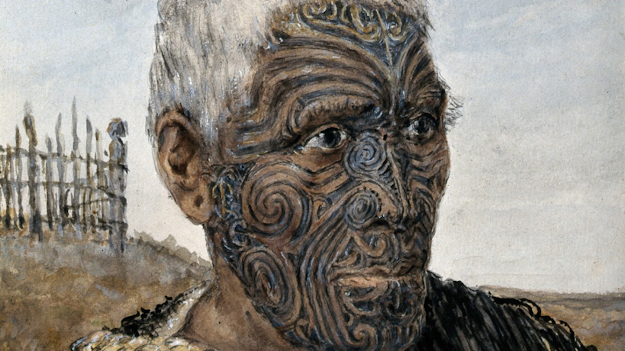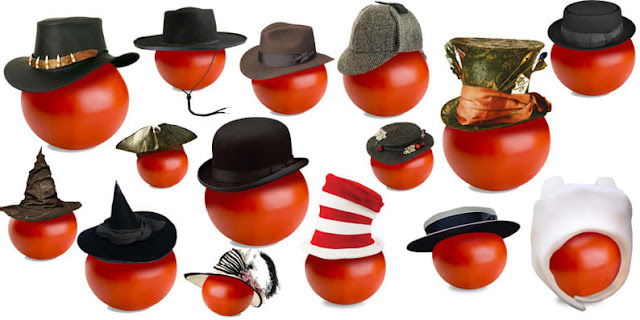Ey Up Mate, You Look Like a Colouring Book
"There is no country in the world that does not practice tattooing or some other form of permanent body decoration..." - Charles Darwin, The Descent of Man, 1871.
---
I remember on Tattoo Fixers, a show on E4 about people getting their disastrous tattoos covered with more tasteful artwork, a man getting a zombie tattooed over his entire pelvic region. The plane of pelvic skin where one's hair would otherwise grow flashed an ominous-looking, drooling, somnambulent zombie. It looked fairly cool. But the clincher came when the audience realised he also got the entire length of his penis fully tattooed in the colour and tones of a zombie's outstretched finger. Both designs matched up to give the artwork a feral and desperate look, combining comedy with a kind of toe-curling disgust, with the longing for the safety of your bed, far, far away from anything else that could possibly bring that thing to attention.
Can you imagine maintaing both: a) your dignity and b) your social credit as you stand, timidly but eagerly in front of your artist as you floated that design past them? Even worse, actually pulling your crabbed organ from your trousers to measure up your design? Your artist would think back to their apprenticeships, doing the same four small designs as walk-ins, with the fondness of a cherished family holiday. They'd long for their halcyon days of tattooing malodourous men that gratuitously strained their tattoo beds. I take solace in the idea of everyone watching this horror show unfold, sharing a collective sense of absolute incredulity. That doesn't happen very often for autistic people, and what better thing to enable that than a penis tattoo sleeve?
I shall stop being vulgar now. I want to discuss a major part of what makes me me: tattoos. I understand that having tattoos is not a personality trait, or a stand-in for being personable. Sorry, hipsterinos. But to conceive of me without tattoos is to conceive of a cooked chicken without the skin. The skin is the best bit. No discussions; no writing in, please. Your opinions on that will be inevitably wrong. Perhaps my skin is not my best part, but it, and what is etched upon it, acts as a gateway for a variety of feelings, thoughts and social behaviours that would otherwise be uncomfortable to confront.
I have a variety of gaudy and black and grey, big and small, fresh and faded, visible and coverable, and aesthetic and meaningful tattoos all over my body. I have about 30 in total, assuming you can deconstruct a sleeve and a half-sleeve into counting as singular designs. There is no symmetry, or Golden Rule to them. They have crawled over my skin, from my neck to my shins to my hands, organically and indiscriminately, over time, like a sloth seeking to slowly press its fat form upon me. This does seems intutively disturbing to me. The universe, and by extension society, directly in its image, has a semblence of geometric order. Where would we be without adhering rigidly to some tacit, agreed-upon rules and conditions? What would New York look like without grid-planning? Would it host 8 million residents as it currently does? Would it be the hub of the globe's cultural and political activity? I obviously don't know the answer to that. But following the same line of logic - tenuously, I'll admit - why would intentional scarring on a human body look good or meaningful without reflecting the universe in which its situated?
One obvious answer is: it just isn't that deep. And its not. But there are various other compulsions I have in life that desperately try and establish a sense of purpose and direction to my behaviour. Lining up book edges exactly adjacent to the table's edge, for example; placing my water bottle, when sitting down to work, directly in between the book I am currently analysing and the reserve stack of books to my front-right; my bookcase has to be arranged in reverse alphabetical order, as one would enter my bedroom from the right-hand side. Not totally dissimilar from the Arabic world. So why is a stronger compulsion to space out my tattoos, symmetrically, absent?
The overriding answer is: because to feel is better than to present. Autistic people are stereotypically sensitive (either way) to touch -- we are tactile and sensory-seeking, or reticent and sensory-depraving. Generally speaking, its helpful to draw a line between those two. Of course, some people exist in between those two poles but it is not necessarily my job to speak for the entire autistic community. The feeling of my skin being lifted up by the tattoo needle and having ink inserted under it is incomparable to anything else I could sensorily describe or digest. I was always a tactile child. I'd run and jump around, fling myself into doors and walls and up and over garden fences, run full-pelt into my Nana's stationary form or hold my mum's hands, walk up the front of her actual body and backflip back down. The vibrations that ripple through my limbs and seem to cut deep into my dermis feels like a thousand tactile little Jakes, flinging themselves everywhere, evenly, all over my skin, permeating deep into the many layers that constitute my flesh-pot body.
To an extent, my enjoyment of the product itself, the tattoo, in all its aesthetic, colourful hues and tinctures can be secondary. My artist, pulling back from his chair in a subdued and self-effacing way, saying "okay mate, that's us done," and the ensuing surge of endorphins we both receive as I look in his mirror, admiring my newly-scarred skin, is still somewhat secondary. For, the little Jakes that rattle through my skin, through my body and mind, carry on uncontrollably barrelling themselves around after the needle is withdrawn. The hive of subcutaneous activity continues. The buzz lingers on. There's no euphoria, or drowsiness, for this isn't a conventional drug. It is halfway between an opiate and an instinct. It is as incommunicable as it is nonsensical. There is no sadistic or masochistic element to this love affair, though. I have had tattoos that hurt so badly I wanted to voluntarily wet myself, lamp my artist and then leave. All in that order. Sexual gratification does not even enter the realm of possibility. My love of tattoos - the look as well as feel - speaks more to ritual than it does to admiration of genuinely astounding art.
This is (likely) the case for many, many cultures over many milennia. Tā moko is the Maori term for tattoo but, typically, English cannot quite adequately translate this term. To wear a moko on the face, or the chin and top lip for women, is an "undeniable declaration of who you are," but it also bring to attention the method of transmission; the deep scarring of the face filled with sooty residue; the ritual. And to autistic people, rituals play such a major part of our everyday existence. I often make coffee simply as something to do. Lord knows I don't need more routine. I risk physical addiction everytime I approach that totem of involuntary shaking and caffeine headaches, that maypole of insomnia: the kettle. But the ritual of approaching my tattoist, and him accepting my ideas in the most sagacious of ways, and then having the tattoo physically inked upon me, speaks to a baser truth. That is, any human body, and not just mine, should be used, energised, enjoyed, activated, performed, handled, managed, treated, and so forth. It should be felt. The universe will still die its heat death someday. We can go out with it acting on our primal urge to ritualise; we should feel.
Therefore my tattoo-based ritual is one of feeling rather than enacting, which can be strange for some people to instinctively accept or understand. Yet, neurotypicals are often recommended to regulate their feelings with a greater degree of routine in cognitive behavioural therapy and psychoanalysis. If anybody has ever had therapy, have you ever heard: "why don't you set aside half an hour 'worrying time' on your Friday nights? That way, you can find time for your irrational fears whilst not beating yourself up about their intrusiveness?" Not exactly that, but something of the sort. This is essentially the same as autistic peoples' longing for feeling as well as enactment, and the controlled regulation of feeling. Also consider the neurotypical teenager who will, regularly and compulsively, sit in their bedrooms and listen to sad songs to purge themselves of intrusive feelings or memories (note: I did not gender said teenager as stereotypically female -- yes, Love Story by Taylor Swift is a riotous banger...). And sure, I brew cups of coffee to numb the pain of existence. Who doesn't? But the regularity and acuity with which I feel that needle activate capillary-action underneath my skin is as comforting as stimming, or picking my fingernails, or anything else that conventionally eases autistic anxiety.
For the record, I don't actively advise autistic people to deal with social anxiety by spaffing thousands of pounds on tattoos. They do hurt, they do require patience and physical inaction, they are very expensive and they do require commitment and loyalty. They come with a host of unwritten, uncodified social rules between you and your tattoo artist that can be difficult to navigate. At least, at first. But here I find myself, stuck in the ritual of feeling, doing the customary, ritual dances with touch and sense. And I expect in my lifetime, chaps such as the one I remember from Morrison's will not cease to tell me 'ey up mate, you look just like a colouring book.' But as beautiful as some of the designs I have, they are permanent reminders of not just who I am, but how I am.




Comments
Post a Comment